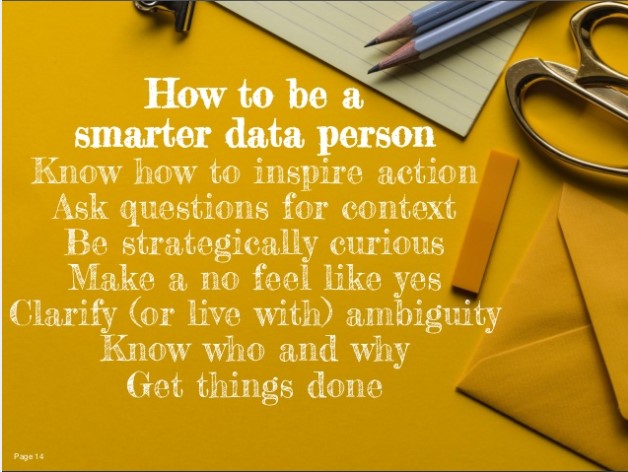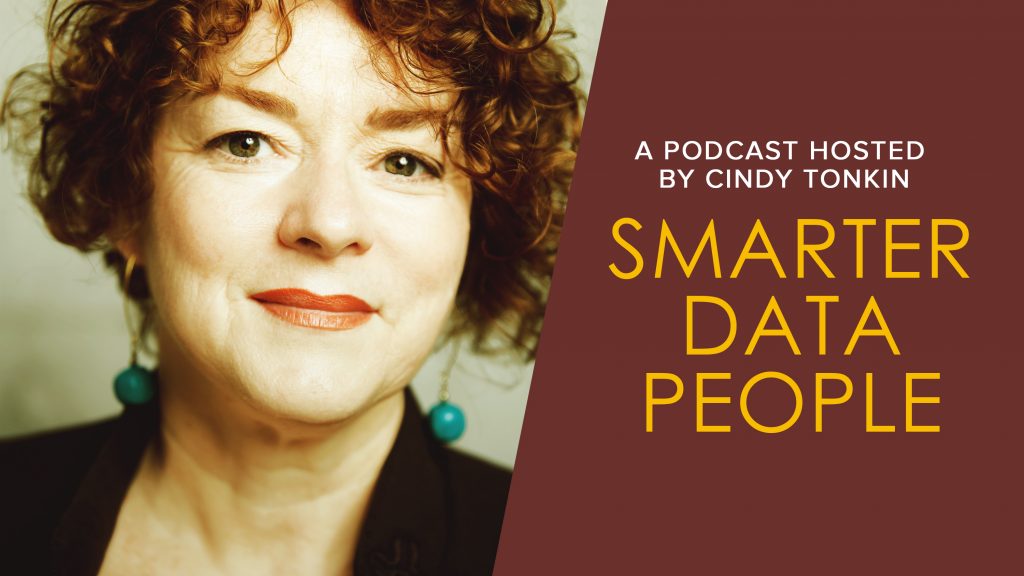
My guest today is Lori Silverman. Lori is not a data person as such: she specialises in getting organisations to shift. And she has some fascinating things to say around how data stories are told.
I first encountered Lori’s work in the early 2000s when I read Wake Me Up When the Data is Over, a book on story telling which is even more relevant today. She has written a few others: here’s a link to her author page on Amazon. And visit her website Business-Storytelling.com for more information about her.
Other episodes are listed here.
Lori and I talk about:
- data science vs decision science
- the future of data and decision-making
- the qualities of an excellent data person (scientist, analyst, whatever)
- strategic thinking.
In reviewing the transcript I found it hard to not highlight almost every sentence for an interesting nugget. I hope you’ll enjoy it too!

Lori Silverman Podcast transcribed
Cindy Tonkin: 00:07 Hi, there. This is Cindy Tonkin, I’m the Consultants’ Consultant. I work with data science teams helping them work even smarter, faster, and nicer. If you’re brilliant, and you want to be even better, this is the podcast for you.
Cindy Tonkin: 00:18 Ladies and gentlemen today, I have with me Lori Silverman. More than 10 years ago, I read a book called Wake Me Up When the Data is Over, and that was Lori’s book. And then, recently, we connected on LinkedIn, which is one of those, “Oh, my God. My hero.” So, here today, I get to talk to my hero, Lori Silverman. Welcome, Lori. Thank you for coming.
Lori Silverman: 00:45 Thank you so much. I’m curious. What sparked you to pick up that book so many years ago?
Cindy Tonkin: 00:52 A client asked me to do some work on storytelling. So, I read your book, and I read a couple of other books, but yours stuck with me. I think yours is the one where it’s like, “No one ever says, ‘Oh, my God. You should just see the PowerPoint I’ve just seen.’ But heaps of them go, ‘You should hear the story I just heard.'” So, the importance of story: it makes things stick and certainly day-to-day, people are really, really clear that we have to know how to tell stories. But Lori, you’ve got an even bigger mission now. You want to talk to us about what your mission, your purpose is?
Lori Silverman: 01:30 Well, actually, I think there’s two different parts to it. This past summer, I was doing a video for a colleague of mine, and he was asking me to reflect over my 40+ year career, and I had my first epiphany. And that was that for the third time in my life, and I’ll be 62 in a couple of months, I was doing something. I was bringing forward what I now would say is a subject that Google Trends doesn’t even recognize, and because I’ve done this twice before in my career, I did it first in the Total Quality Management arena when I did a book with a colleague that looked at the future of that quality movement. And my former husband wrote a fable for me called How the Queue Lost Its Tail: From Total Quality Management to Total Organizational Management. And that’s about circa 1999. And then, I did it again with the storytelling movement, the book that you mentioned, Wake Me Up When the Data is Over, was my second of three books that I’ve written in the field, but that book in particular was groundbreaking because no one prior to that time had looked at the application of story across multiple business functions.
Lori Silverman: 02:49 And to this day, that still is the largest study, the largest worldwide study of the application of story from an action research perspective and really opened the doors to so many different people. I kind of wanted a different route after the book came out, but there are a lot of folks who say what you’ve said to me, “You’re my hero, or I started a whole business as a result of that book.” I’m like, “Oh, good for you.”
Cindy Tonkin: 03:16 Yeah. All the opportunities you create and then move on.
Lori Silverman: 03:20 Yes, exactly, except this third time, I don’t think I’m moving on. I think that this third time, I’ll actually see through to fruition what it is that I’m trying to do. So, it takes me back to when I was 30 years old. I was blessed to work for one of five companies affiliated with W. Edwards Deming in the quality arena. But what was unique about my company and my work was I was an organization development consultant managing other people who had my background and statisticians who had Masters or where PhD prepared. And we were shifting the culture of organizations, which is what people are trying to do today when they talk about data culture. And we figured out how to embed data into all kinds of decision-making and actually shift entire organizations. And today, people are really struggling with how to do it, and I kind of wave my hands and say, “I’m here. Hello?” When people look at me, and the words have changed the … the tenor has changed a little bit, but I don’t think what we’re trying to do is any different.

Data Culture, Data Literacy 2.0
what people have forgotten is that it’s not about the data. I tell people data is meaningless on its own. What really matters are the decisions that need to be made in organizations.
Lori Silverman: 04:34 And the challenge we have, though, today is we don’t know really what to call this work. Over a year ago, some people started to call it data literacy, and those were a few of the tech companies who came together, and there are two different websites, one called TheDataLiteracyProject.org, and then there’s The Data Literacy Foundation, where, again, these are tech-focused websites that are encouraging people to become data literate. And I thought, “Well, maybe that’s a name for what I’m doing because I put together based on a chapter in my last book with Karen Dietz. The book is called Business Storytelling for Dummies. I put together a method with her that I called Collaborative Data Informed Decision Making, but now, what we even know in the past … I’d say the past several months, is that there’s a bigger area called Decision Intelligence under which that falls. So, I have started to create what I’m calling Data Literacy 2.0 because I think that what people have forgotten is that it’s not about the data. I tell people data is meaningless on its own. What really matters are the decisions that need to be made in organizations.
Lori Silverman: 05:50 So, to me, Data Literacy 2.0, as I’m defining it, is the enterprise core competence, not the individual core competence, which people still need to know. But I’m biased. I believe people need to know more statistics than they are getting because a lot of the data visualization software that’s out there does not teach statistics. It’s horrible. I mean, I see people going, “Oh, look at that point is going up on this chart.” And I’m like, “Yeah, so what? What’s the variability in that? Have you calculated control limits?” And they look at me like I have a screw in my head, right? So, Data Literacy, 2.0 is that enterprise core competence and the culture that underlies collaborative, data-informed decision-making. Because I’m blessed. I’m blessed to be one of those few people who knows what done looks like, right? If someone says, “Well, what does a transformed organization, how would it operate?” I can write that vision story. It’s embedded in my brain, and I’ve done it several times. However, I don’t know. People are very interesting when I talk to them about this around the world, and the question really is, are we ready to take on this more enterprise piece?
Lori Silverman: 07:07 And I think that the jury’s still out on that. I will continue to thrown down my gauntlet because when you embark on these new and different things, which I call bleeding edge, I know from the past that it can take, 5, 10, 15, 20 years, maybe longer, to even become mainstream. I wouldn’t even say business storytelling’s mainstream, quite frankly.
Cindy Tonkin: 07:31 No.
Lori Silverman: 07:31 I think more people talk about it, but heck, I mean, Karen, who I wrote with, I mean, she was on Wall Street in the 1970s, working with C-Suite leaders on business storytelling. And what year is it about to be? 2020?
Cindy Tonkin: 07:45 I know. Hilarious, isn’t it?
Lori Silverman: 07:49 So, it’s been a while.

Data needs a voice and we need to get it to talk
Cindy Tonkin: 07:50 So, you’ve mentioned some of your journey. Give me some background on where you’ve come from, so organizational development, obviously. But you’ve got an academic background? You’ve got some stats in there somewhere?
we don’t understand the difference between observations and insights
Lori Silverman: 08:03 Well, I have two Master’s degrees. I have a Master’s in counselling psychology and an MBA. So, obviously, you have to have statistics when you’re in those, but the practical approach to statistics is something I learned from the statisticians that I worked with because the company that I was a part of, we did what people are doing today with analytics. We had three-week courses you had to go through to learn statistics. And what I remember saying to the woman I worked with the most, and we work together for almost, oh, my gosh, over a decade, was you’re all making this too hard for me. Making it too hard. And what she said to me, “Well, the simple thing is we have … Data needs to have a voice, and we need to get it to talk.” I would change that today, and I would say it’s not that data has a voice. We have a voice. We as people have a voice, and we have to give voice to the insights that are in data. But what I now observe is that we don’t understand the difference between observations and insights, and that’s a whole ‘nother topic.

Venn Diagram: Strategic Thinking, Story telling, Decision intelligence
Lori Silverman: 09:07 But in terms of my own background, those three years of consulting for a company called PMI, which is where I got to work a lot with statisticians and supervise them but really opened my eyes to the whole idea of how do we transform large organizations. I’m talking about tens of thousands of people. When that was finished, I added two more pieces to my background. I’m a strategist and a futurist.
If I were to draw a Venn diagram today, one really huge piece is what I call strategic thinking. And from an academic perspective, I teach the only graduate course in the world on strategic thinking in an industrial and organizational psychology Master’s program. And I’ll start that course up again in January.
And then, I add to that this whole area of decision intelligence, which requires you to understand decision-making and how the brain works around decision-making. And then, the third piece that I spend a lot of years on is the business storytelling piece and so, to me, it’s like it’s a Venn diagram where all three of those have come together, and quite frankly, I don’t know what to call it, other than to say, well, if you search Google, at least data literacy will come up. I have to hang my hat on something until I can figure out my own name for it. But it’s the best that we have at this point in time. So, I feel very blessed that in a very serendipitous sort of way, my career has led me to what I call my legacy work. I’m very clear that this is what I’m meant to do for the rest of my working career, which will be until the day I cannot get on an airplane and the day I can’t think and do videos and things like that. So, it could be the next 20, 30 years.
Cindy Tonkin: 11:09 You’re doing some LinkedIn learning stuff at the moment. How do people connect to that?
Lori Silverman: 11:14 Actually, what I have is a LinkedIn live account, and that’s a bit different than LinkedIn Learning. So, I feel really blessed again. I had a situation happen last July where I was to be on two LinkedIn Live shows as a guest, and neither of them happened. And the result of that was me saying, “I wonder how people get a Beta account,” because it’s still in Beta mode. And I went to the website, and I read through the form and talked to my colleagues, and everybody’s like, “Oh, you can’t get it. I mean, I’ve been trying and filling out this form.” And I thought, “What’s the worst thing that could happen?” And I put in that this fall, I was going to be starting a speaking tour in Cape Town, South Africa that would eventually wind its way into Canada and the US, into London and then back into the US. And I named all the cities, and I said, “Wouldn’t it be fun to be able to do a LinkedIn Live show from all of those different places. That was in July. The end of October, I was in Vancouver when I got the email that said, “Congratulations, you’ve been granted this show.”

Level up with Lori
Cindy Tonkin: 12:25 Congratulations. Yeah.
Lori Silverman: 12:26 Yeah, and I’ve called it Level Up with Lori, and Level Up, I was looking today. The term Level Up is not even in the dictionary. It’s a term that Webster’s and others are watching. It’s a trending phrase that they may put into the dictionary, but that phrase comes out of the gaming industry, which to me, it’s so appropriate because if people … You can’t hit home runs in terms of learning. You have to just go up to that next level of mastery, and as you get to that next level of mastery, new challenges and new problems appear, and you need to go off in different directions. So, my shows are going to be quite diverse. That first one that we just did was on the collaborative decision-making process that Karen and I developed, which she and I will do a follow-up show on what … I think we’re calling it, Why Your Data Story Sucks because-
Cindy Tonkin: 13:28 Yeah, it does.
huge misnomer in the industry … that describing the data or using a data visualization means you have a story, and that’s not at all [true]
Lori Silverman: 13:29 Yeah. Oh, yeah. There’s a huge misnomer in the industry because of the constraints of software that describing the data or using a data visualization means you have a story, and that’s not at all a narrative story. And so, I feel like we need to kind of set the record straight and talk about how do you take insights and then strategically crazy stories that get told or shared with different stakeholders. And there are a variety of nuances to that. And then, I’ll do another show with a woman who is a market strategist, and we’ll talk about why it’s more important today to become an influencer rather than a thought leader.
Cindy Tonkin: 14:16 Oh, interesting. Very interesting.
Lori Silverman: 14:19 Oh, yeah. And that show’s going to happen in January 2020 as well. We were having a conversation about this in August, and so many people in the data science industry or in any field related to data and analytics think that it’s about building expertise when it’s not. It’s about building your visibility and your likeability and your credibility. And so, we’re going to talk about that and what are her views and why has that changed, and I told her. I said, “I smile because I’ve always said my academic work as an adjunct,” I said, “I want to be a rock star.” And I do. I want to be a rock star. And that is-
Cindy Tonkin: 14:55 And you already are. You just don’t necessarily meet all the people who know that you are.
Lori Silverman: 15:00 Thank you. Exactly.
You don’t need another course in how to do the thing that you’re doing. You need a course in how to promote and influence people to pay attention to the thing that you’re already doing.
Cindy Tonkin: 15:01 My second book was called Consulting Mastery: The Ability Myth and it was exactly that. You don’t need another course in how to do the thing that you’re doing. You need a course in how to promote and influence people to pay attention to the thing that you’re already doing. Not to say people shouldn’t ever upgrade their skills, but it’s like if nobody knows you’re doing it, and no one’s making a different decision because of the information that you have, then it’s like a tree falling in a forest. Does anyone actually hear it? Who knows?
Lori Silverman: 15:37 Exactly.
Cindy Tonkin: 15:39 So, is there a channel people tune into on LinkedIn? How do they get to know that you’re doing this?
Lori Silverman: 15:46 That’s a really good question. LinkedIn isn’t that sophisticated. They make you buy a software yourself to use to be able to do the streaming. I stream simultaneous to LinkedIn and to YouTube. So, the only way that people would know about the shows is if they ask to connect to me. Once they do the connection, then what will happen is I put up teaser announcements, just say, “Hold this date and time.” And only when the show goes live does LinkedIn send you a notification on your phone that says, “Lori’s LinkedIn Live show, Level Up with Lori, is now a go.”
Cindy Tonkin: 16:22 Oh, really?
Lori Silverman: 16:22 And then, you go into your notifications. You click on it, and then, you can comment and talk with us.
Cindy Tonkin: 16:28 Wow. Okay.
Lori Silverman: 16:28 Yeah.
Cindy Tonkin: 16:29 Okay. Well, I’ll put some links so people can find you on linked in much more easily because I’m sure that there will be some absolute value in that. You got any other good ones planned?
Lori Silverman: 16:40 Yeah. I’m talking tomorrow, and I don’t know what we’re going to focus on, but I do some course development work for Ubiquity University, which is really cool. They have no brick and mortar. So, all of the folks work out of their homes all over the world, and they are creating mini and micro-courses for people to take, and I’ve developed one course for them called From Data to Insight to Action, and then, I’m developing a second one on Strategic Thinking. It’ll be 12 x one-hour lessons. I don’t teach them. I just write them, and then, someone else facilitates. Whenever there are enough people ready to take the course, that’s when I hold the course. And I am not yet clear what Shelly and I are going to talk about. Shelly Alcorn will be my guest, but I think it will be about the huge, huge disruption that is already starting to hit higher education. We’re about to see a significant decline because of demographics and the number of people going to universities and colleges, and I don’t think we’re prepared for that. There are so many places that are already not financially healthy. And in the next five years or so, they’re going to fall off a precipice if they’re not prepared for how they can rethink and reshape what they’re doing.

Strategic Thinking
Lori Silverman: 18:07 And I think that part of that, for me, is how do you get away from brick and mortar, but the second thing is something I did in 1995 with Duquesne University when I did their strategic planning. The dean of the business school who I was working with said to his faculty, “Write for me a strategic plan with three breakthroughs where we do not have to be dependent on student tuition.” And we did. We wrote it, and they made money, hand over fist. Of course, the university was like, “Hey, wait a minute. We’re over here. School of Business, what are you doing?” But it opened my eyes, and I think that that may be something we need to start looking at. And I’m want to hear Shelly talk about it and what she sees being on the horizon for people who really are those lifelong learners and how can they learn in new and different ways.
Cindy Tonkin: 19:00 Yeah. Absolutely. Very, very important. So, clearly, you’re a lifelong learner. Is there something special you do? I mean, is it just a client asks for something, are there things that you follow, other people’s channels or branches of study?
Lori Silverman: 19:22 That’s actually a really interesting question. I see gaps. They just appear around me. My brain works a bit differently, I think, than other people. My skills are in are synthesis, not analysis. And because I do scans, environmental scans for my clients going out to the year 2040, and we do foresight work, not forecasting work, I have that as a backdrop. So, I already kind of know what the future’s going to look like. I lead workshops on scenario planning. So, I know what different sorts of trends or wildcards or black swans or perking events are on the horizon. And then, I’m a scanner. And I tell people, I have this whole bookcase. I’m about to take a picture of it. It’s four shelves of books, and they’re all the books I bought in 2019 that I haven’t read, and I would like to have the chance to read. I buy them because I know that I either want to talk to the authors, or there’s a chapter or two in them that really intrigues me. So, once I start to scan those, I’m going to start to see more missing pieces.
Cindy Tonkin: 20:39 Yeah. Yeah. Exactly.
Lori Silverman: 20:42 And I listen. I don’t do the typical. I don’t stay within my fields of expertise. I’ll give you an example. I go to Coachella music festival. Now, a lot of people are like, “What would a woman who’s in her 60s be doing at a music festival with 125,000 folks who are probably under the age of 25?” And you see a lot. You hear a lot of interesting conversations. You see what trends are happening in the music. You see the foods that are being put out. You have conversations with people from all over the world. I go by myself because I don’t want to be burdened by someone else saying, “Oh, we have to go to this tent or do this over here.” I want to look at the art installations. I just want to be.
I don’t do the typical. I don’t stay within my fields of expertise… what is a woman in her 60s doing at Coachella music festival?
Cindy Tonkin: 21:39 So, yeah, that’s your research, isn’t it?
Lori Silverman: 21:43 It is, and because I live in Las Vegas
Cindy Tonkin: 21:46 You see everything.
Lori Silverman: 21:47 I see everything. I live on the strip, and we are changing all the time here, new restaurants, new artificial intelligence installations, new shows, new music. We have a new theatre that’s being built in the round that it’s only supposed to be like one of two in the world.
Cindy Tonkin: 22:08 Wow.
Lori Silverman: 22:09 We talk about new building materials. It’s a very fascinating city because we’re not bogged down by a lot of bureaucracy, and there are some reasons for that.
But we do things really fast, and other than being in New York, which is where I lived for a couple of years, or in London, which is where I’d love to live part-time, where else do you go, right, to have that level of energy?
And you have it. I mean, you have it in pockets as well. When I’ve been to Sydney, I see it. And that’s what informs me. It’s how are people living their daily lives? How are they responding to things? And then, I take that back into my work, and I still, then, read all the technical pieces, and quite frankly, my students are wonderful, my graduate students.
For example, with the strategic thinking class that I’ll teach this January, and I’m just finishing up right now with a course, a graduate course, in organizational development. My students are challenged to give me articles that relate to the topics that we’re talking about that I haven’t seen.
Cindy Tonkin: 23:22 Oh, that’s mean.
Lori Silverman: 23:23 And oh, no, they love it. They love it because they can bring in things from other classes, and no one else allows them to do that, and that’s that level of integration again.
Cindy Tonkin: 23:30 Yeah. Exactly. Sounds like a theme. Let me see what else I … Oh, we could talk about the “how do you explain things to complex people,” but I imagine the answer’s going to be you do proper stories.
Lori Silverman: 23:47 Well, yes, I do, but I’m also … What most people don’t realize about me is I have an instructional design background. So, I’m very fortunate to have worked and led a training and development group in my … I’m going to say in my youth, I guess, and that-
Cindy Tonkin: 24:04 You’ve had at least five careers, surely.
Lori Silverman: 24:06 Right. Exactly, but I did it in healthcare. So, let’s talk about technical jargon and making complex things simple, and that is the gift that I also have. I said it’s kind of like Einstein. When he came up with E=mc2, it was simple, and it was elegant, and that has been a principle that has guided my entire life.

What are the decisions you need to make?
So, a couple weeks ago, I worked with 17 CEOs on collaborative, data-informed decision-making, but I didn’t take them through the methodology. Where we started was what decisions are you making.
And what they walked out with was our dashboards are not designed with decision-making in mind
Write down on paper for me what are the strategic decisions you need to make in the next 90 days. What are the ongoing operational decisions that you need to make? Because oftentimes in operations, it’s the same decisions month in and month out, and then, what are the ad hoc tactical decisions that you need to make? And that’s where we started. We didn’t start with data. In fact, we never really talked about the data. We talked about decision-making processes and knowing the decisions.
And what they walked out with was our dashboards are not designed with decision-making in mind, right? So, then, that gets at, well, when are you going to toss them out? Or one example I used of a weekly report that’s over 60 pages long of data. Oh, my. I’m like-
Cindy Tonkin: 25:33 No one’s going to read that.
they need to shift these score cards and the request dashboards. They need to start thinking differently, and so do we. But that’s not the way we’re taught because we’re taught to think about the data and not about the decision.
Lori Silverman: 25:34 Well, they have a meeting about it every week. So, how are you going to find the golden nugget, that one insight in there that you need to run your business for the next seven days or the next month or year or whatever? It’s going to be really hard. So, just having those realizations that they need to shift these score cards and the request dashboards. They need to start thinking differently, and so do we. But that’s not the way we’re taught because we’re taught to think about the data and not about the decision.
Cindy Tonkin: 26:06 Yeah. Absolutely. And certainly, in my experience, you’re exactly right. When people sit down and go, “What are the decisions I’m making? What information insights do I need to make those decisions,” that’s a much smarter place to start. And probably, it’s a better rapport-based way to start because they know what decisions they need to make. They don’t know what data they need.
Lori Silverman: 26:27 Correct.
Cindy Tonkin: 26:29 And if they leave that to a data person to decide, it’s possible they’re going to be flooded with data, or they get data that doesn’t actually answer the question they want to answer.

Interesting insights vs meaningful insights
Lori Silverman: 26:38 Well, what you get are interesting insights. You don’t get meaningful insights. And so, what this story has taught us is how to figure out what insights exist based on how people respond when we start to talk about what we’re learning. And what we really want people to start saying is, “Oh, my gosh. I need to shift how we do A, B, C.” But to go back to that question piece, the questioning area, which is now gaining popularity in the literature, is missing a couple of things. One is that questions are still too broad, and the questions are all focused on just getting knowledge. They’re not focused on action. So, when I sit down, I actually use in workshops that I teach, I have sample questions, and I say, “These are written as knowledge questions. Now, reword them for me as action questions,” and people have one heck of a challenging time doing that. And when they are successful at making that transition, what they realize is that if you don’t get to the action, people in a meeting will stop and say, “Okay. We got the knowledge we needed. We’re done.”
Cindy Tonkin: 27:55 Yeah. But we’re not. Now, do something with it. Yeah.
Lori Silverman: 27:57 Yes. Now, doing something with it. And that’s, I think, a huge shift as well in the field. So, it’s just very simple languaging sorts of things.
questions are still too broad, and the questions are all focused on just getting knowledge. They’re not focused on action.
Cindy Tonkin: 28:05 And these are all things that people already know how to do. It’s not like they’re missing a brain cell around these. It’s just that we never asked … They never thought of it in that way. So, essentially, it’s a turning of their brain to what’s important other than-
Lori Silverman: 28:20 Yes. Well, and it’s also something more because if you’re dealing with a C-Suite leader, and you get to the … You may or may not be able to get to the question because it could be one that’s extremely sensitive that you are not allowed to know.
Lori Silverman: 28:34 So, that’s one issue that you have to deal with. A second issue you have to deal with is that they may already have had an insight, and I’m not talking intuition because intuition and insight are different, but they may already have had an insight that needs to be actioned. And then, the person who’s working with them says, “Oh, they are so biased. They want me to collect data to confirm their insights.”
“They want me to collect data to confirm their insights”
And my response is don’t collect the data. I …say, “If you believe 1000% that that’s the direction to go, then let’s not waste any time because I’m going to tell you right now it might take me quite a bit of time to get you what you need. I’d rather you take the time and start actioning as long as you promise me one thing. If the action’s wrong, you’ll change it, and you’ll move in a different direction. And second, I’m happy to do concurrent inquiries for you on this question only if you’re willing to look at what I put together. If you’re not willing, I’m not going to bother.”
Lori Silverman: 29:00 And my response is don’t collect the data. I just look at that C-Suite later and say, “If you believe 1000% that that’s the direction to go, then let’s not waste any time because I’m going to tell you right now it might take me quite a bit of time to get you what you need. I’d rather you take the time and start actioning as long as you promise me one thing. If the action’s wrong, you’ll change it, and you’ll move in a different direction. And second, I’m happy to do concurrent inquiries for you on this question only if you’re willing to look at what I put together. If you’re not willing, I’m not going to bother.” And I don’t think we have those sorts of tough conversations. “Oh, I can’t say that to a business leader.” I’m like, “Here’s the deal. If you can’t, you won’t have their respect.”

What if they want you to confirm their intuitions?
Cindy Tonkin: 29:44 Yeah. Absolutely.
Lori Silverman: 29:47 Which means you have to have developed the relationships already, and the other thing I do is if we have an actionable question, and I say to a leader, “Just play a game with me, what do you think the three likely outcomes could be?” And they list out one, two, three, I don’t stop there. I then say, “What actions would you take if it were one? What actions would you take if it were two? What actions would you take if it were three? And are you willing to take those actions? Because if you’re not, then don’t bother me either.”
Cindy Tonkin: 30:17 Yeah. Exactly. We have to stop saying yes to everything. We have to start making a no sound like a yes in the sense that I want to help you get what you need, which is, as you’re saying, an action, a decision. If you’ve already made, and you just want me to prove it, well, just go ahead, and if not, it’s a conversation that, I agree, very few people are actually having. They’re just saying, “Okay. Great. I’ll take your order. I’ll do your thing.” And then, behind closed doors, they’re going, “Oh, nobody wants to actually … Nobody wants my information to blah, blah, blah.” So, yeah.
Lori Silverman: 31:02 Right. And I know that there are people who say,” Well, if I give somebody what they’re asking for, that will endear me to them.” However, if nothing is done with it, how have you forwarded the agenda for the organization as a whole. It’s not like I won’t do what a business leader is asking me, but I push back. I have my rule of three. I push twice, and if you still want me to do it, that third time, I’ll go ahead, and but I’m going to tell you the consequences of what I’m going to do. And the reason I do that is because not everybody’s going to be jumping off a cliff, right? So, that’s why I push a couple times. But if I do think that you’re going to fall off a cliff, then, I’m a little bit more, “Okay. Here’s the deal. You’re going to fall off a cliff if you take that action. I just want you to know that that’s the decision you’ve made, not one I’m making for you.” And happy to help you when you figure that out, but just be aware.
Cindy Tonkin: 32:08 Fabulous. So, given that you’re not a data scientist, but you work around data scientists, do you have particular skills or qualities you think are essential in a data scientist or a data analyst, people working in data insights?

Essential data skills and qualities
Lori Silverman: 32:27 Well, I think it’s the pieces that are missing from a more human perspective. One is the ability to build strong, trusting relationships because what we know, and I learned this from a business leader in eastern Europe who said to me, “People talk about scrubbing data or cleaning data.” He said, “But I don’t care how clean the data is. If I don’t trust the person who’s giving me what I’m asking for, I don’t trust it. I don’t trust anything.” So, I think that that’s the first thing is really spending time developing strong relationships or getting the confidence of people who are asking you for things so that you can get the inside scoop on what is going to be done with the work that you’re doing. The second piece is that someone has to orchestrate the decision-making process. And I speak a lot at business analysis conferences, and data scientists are leaving out BAs, and I think it’s really disquieting to me. And it doesn’t have to be a BA. I have an organization development background. I can do the same work as well, or someone in quality can do the same work as well.
data scientists are leaving out BAs, and I think it’s really disquieting
Lori Silverman: 33:38 But I think someone needs to shepherd the steps in the collaborative, data-informed decision-making process from the questions and raw data through to the observations, the insights, and then to the story of the insights to action. And right now, it’s all very, very fragmented, and people are saying that data scientists can do that. I’ve not seen any who are willing to do that whole process because they’re steeped in the data. And then, we’ve hired them to do that more deep dive. And so, I think it’s learning how to collaborate and knowing the right sorts of people to bring in and not excluding the organization because, right now, what’s being done in my observation … I don’t mean this to be a loaded term. It’s the only one I can think of … is fiefdoms are being created in the data community, and those fiefdoms do not recognize the mother ship, the mother organization. Never forget that the mother organization holds the power, and it can take you down just like it gave you the money to set you up, right? And if it doesn’t see, if it’s not integrated into … I think the third skill set is learning organizational Change Management, and I’m not talking the small C, small M, that project management talks about.
fiefdoms are being created in the data community, and those fiefdoms do not recognize the mother ship, the mother organization. Never forget that the mother organization holds the power, and it can take you down just like it gave you the money to set you up
Lori Silverman: 34:59 I mean, truly how to make transformation happen from an organizational perspective. And obviously, this is my ideal list of things because you’ll never find this on a laundry list of skills that a data scientist should have. But if you have those skills, you will become a rare bird because you will know how to shift teams and departments and business units and eventually, whole organizations. And I have seen people singularly do that because they understand the sorts of seeding that needs to be done in terms of shifting of mindset to make behaviour change happen. So, those would be on my wish list and-
Cindy Tonkin: 35:40 Wow. Yeah. Fabulous.
Lori Silverman: 35:42 Yeah. And the story, the true narrative story piece, but again, all of this fall under the field of organization development, and we don’t teach that all that frequently either. You don’t find a workshop on that. You find only graduate degrees or certificates, right?
Cindy Tonkin: 35:59 Well, and it’s also something you can’t do in a two-hour workshop.
Lori Silverman: 36:01 No, no. You can’t. You can’t.
Cindy Tonkin: 36:03 It’s not a lunch and learn topic.
Lori Silverman: 36:05 No. Well, it’s a lunch and learn topic in that I can make you aware.
Cindy Tonkin: 36:09 Yeah. Absolutely. Yeah, yeah.
Lori Silverman: 36:10 Right? And then, you can start to make some decisions about where do I want to go, but you don’t … I mean, right now even, another piece that I have of I don’t see is Lorien Pratt, 10 years ago, started to talk about decision intelligence as a whole new academic arena. And she said it was the intersection of data science, management science, and the social sciences, and I would pull out the psychological sciences because I think we have so much brain research today that we need to focus on. But she just came out with a new book called Link, and Cassie Kozyrkov at Google, I knew that this was going to become a bigger thing when Cassie changed her job title from Chief Data Scientist to Chief Decision Scientist.

Decision Science, Data Science
Cindy Tonkin: 36:53 Interesting.
Lori Silverman: 36:55 Instagram wrote an article back in January that it has groups of data scientists and groups of decisions scientists. To me, that’s that collaborative decision-making piece. If you do not know that, oh, my gosh, that right there is going to … It’s going to be the next big wave. Now, it might not happen for a few more years, but it’s on a lot of people’s radar screens. So, again, being able to facilitate that, knowing how to run teams, knowing how to bring people together.
Cindy Tonkin: 37:27 So, Lori, you travel an awful lot across the world. Where are you travelling next?
Lori Silverman: 37:33 Yes. Where am I travelling next? Well, in the US, this is the end of the college football season. I am attending three of the college bowl games because my team is in the Rose Bowl, but I absolutely am a college football fanatic. So, from a personal perspective, I’ll be in Phoenix, Arizona and in Pasadena, California for the bowl games, yeah.
Cindy Tonkin: 38:00 Fabulous.
Lori Silverman: 38:00 And then, from a work perspective, my next overseas trip will be to Brussels to speak at a conference. I’ll do a workshop and a keynote on my methodology. I’m absolutely thrilled to be doing that. Like I said, I was in Cape Town, London. I’m going to London once or twice a year now, and I think that what I’m seeing is that people outside the US and Canada are actually more receptive to some of the ideas you and I have chatted about.
Cindy Tonkin: 38:36 Oh, really?
Lori Silverman: 38:37 Yeah. And I’m not quite certain why that is, why we’re being more myopic here. I mean, we’re opening up people’s eyes, but not fast enough to the possibilities of what can be.
Cindy Tonkin: 38:48 That’s fabulous. Now, one of the questions I always ask people is what their favourite charity is. Do you have a favourite charity?
Lori Silverman: 38:56 Wherever I’m living, because I’ve moved a lot. It would always be a food bank.
Cindy Tonkin: 39:04 Practical. It’s real. It’s action.
Lori Silverman: 39:06 Well, and I believe that unless you have a full belly, you don’t have the ability to be curious and to learn or to sleep and have everything else. And so, to me, that’s one of the real basic human needs that is in the forefront. And then, also for me, is mental illness because we’re seeing more of it in the workplace, and we don’t know how to address it. I see it with my graduate students. It’s front and centre, and we’ve got to figure out how to make life easier and what are the accommodations that we’re going to be making, and how do we educate people that these are not bad people. It’s not bad illnesses. I mean, like I said, I have a counselling psychology background. So, I have a real place in my heart for that as well.
Cindy Tonkin: 40:01 Yeah. Absolutely. So, is there anything, Lori, you want to say before we finish up? I could speak to you for three days, but I imagine you’ve got other things to do on this sunny afternoon in December. Any final words you want to put out there?

Get to know the brain better!
The brain hates data… even as a data visualization … the brain has a very difficult time comprehending, and it takes it too much time, and it’s too much work.
Lori Silverman: 40:19 Well, I think for your audience is to start looking at some of these other fields of study, the management sciences, the social sciences, especially brain research. I’ll kind of leave you with a little bit of a teaser. The brain hates data, and I don’t care what form you give it to the brain, even as a data visualization or even if you’re Hans Rosling who’s describing data in his TEDx talk, that’s still data. And the brain has a very difficult time comprehending, and it takes it too much time, and it’s too much work. We’ve got to start incorporating brain research into our work, and that’s where story comes in, narrative human stories. So, to me, that’s a really big challenge because a lot of people will say to me, “Well, can’t I research the right to that we agree to disagree?” And I’m like, “You want to disagree with brain research? Really?” And then, in the academic journals that I read, we call these things zombie ideas. They’re like zombies. You can try 10 different ways to call them, and they just keep resurrecting themselves.
Cindy Tonkin: 41:30 Keeps coming back.
Lori Silverman: 41:30 And so, I think that for anyone in this field, start to learn how the brain operates when it comes to data and to decision-making, and it will profoundly shift how you do your work.
Cindy Tonkin: 41:45 Is there any particular work, person’s book, or website that you would recommend around that?
Lori Silverman: 41:52 Well, I’m going to say the next LinkedIn Live, the show I’m going to do with Karen Dietz.
Cindy Tonkin: 41:59 Definitely.
Lori Silverman: 42:02 Because we made a decision a couple days ago that we would talk about brain research. So, we’re going to bring together a lot of it. And we will provide people with references. But the thing is that it’s so scattered. It’s not in one place, and it’s not coming out of one institution. So, you kind of have to cobble it all together, and that’s what we hope to do for people. And then, people can do their own independent research from there.
Cindy Tonkin: 42:27 Yes. That’s certainly one of your strengths, as you’ve described already. You’re out there in so many different places that you bring back stuff and knit it into a thing. Now, your LinkedIn Live, do they keep it on LinkedIn after it’s live? Can people watch replays?
Lori Silverman: 42:46 That’s a really interesting question. That’s why I’m also streaming it to YouTube because it’ll always be there under my channel. So, if people sign up for the channel, they’ll see that show. The LinkedIn, I don’t know where they go on LinkedIn, quite frankly.
Cindy Tonkin: 43:06 Well, that’s okay. I’ll get your YouTube channel, and I’ll link to the YouTube channel. So, just in case by the time people listen to these things, I know myself, I’ve just been listening to some podcasts that arefour years old. If you’re listening to a four-year-old podcast, where can you listen to this fabulous information? Well, you can go to the YouTube channel where Lori’s stuff will all be there. Fabulous.
Lori Silverman: 43:26 Yes. So, I keep the links as well for myself on LinkedIn. And on my own personal page, what I’m doing is I’m linking to the YouTube.
Cindy Tonkin: 43:37 Yeah. Great.
Lori Silverman: 43:37 So, that way, that’s where people can find most of my media, the webinars I’ve been doing, the videos, lots of podcasts like we’re doing today where they can hear other different perspectives and different angles of what we’ve been talking about.
Cindy Tonkin: 43:54 This is … I’m just excited having met you. Thank you so much. My hero, Lori Silverman.
Lori Silverman: 44:00 Thank you.
Cindy Tonkin: 44:01 Thank you so much. It’s been marvellous! I would love to talk to you again in another few months. Let’s do it again if we can, and we’ll talk about something else because you’ll have moved on because you never step in the same river twice, and clearly, you’ve got so much amazing knowledge of so many different fields that I just I feel really privileged for having spoken to you for this long.
Lori Silverman: 44:25 We’ll, you’re very, very kind, and I would love to join you again in a few months to say what’s new on the radar screen.
Cindy Tonkin: 44:31 Yeah. That would be so good. Excellent. Let’s do that.
Cindy Tonkin: 44:40 This is Cindy Tonkin on the Consultants’ Consultant, and you’ve been listening to Smarter Data, people. This is part of what I do to understand how it is that data scientists can be more effective in the workplace, working smarter, faster, and nicer.
And if you have a team, and you find them harder to manage than they could be, if you’re constantly trying to squeeze more out of your budget and out of their time, and if they’ve got stakeholders who are less than happy sometimes, maybe a lot more than sometimes, it can be really annoying. It can make you feel incompetent.
I can help you help them get to the important problems faster, target the wasted time and save you time and money and ultimately delight stakeholders so that you can feel competent again. It’s such a good feeling. Talk to me.





